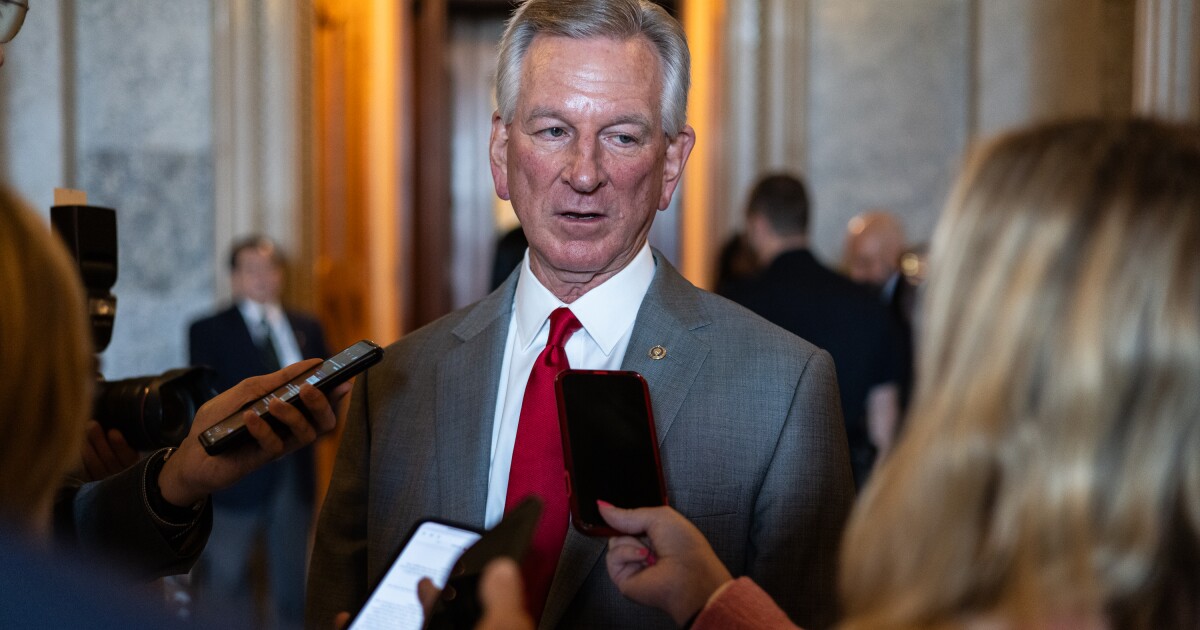

Sens. Mark Kelly (D-AZ) and Tommy Tuberville (R-AL) verbally sparred over who is the most pro-military during a heated Senate Armed Services Committee hearing on Thursday.
Tuberville said that “there’s nobody more military up here than me” during the hearing for the nominations of Derek Chollet, who has been picked to be the next undersecretary of defense for policy, and Cara Abercrombie, who will be the assistant secretary of defense for acquisition if confirmed.
GOVERNMENT SHUTDOWN: HOW YOUR SOCIAL SECURITY PAYMENTS WILL BE AFFECTED
Kelly, a Navy veteran and former NASA astronaut, took exception to his claim when it was his turn to question the witnesses, which occurred immediately after the Alabama senator’s time.
“As far as I can tell, there’s at least four of us, maybe more, that served in the United States military. In some cases, for decades, and at least three combat veterans,” the retired Navy pilot said. “So, I take great exception to what Sen. Tuberville had to say, and I’ve heard him say it before, and it just doesn’t make any sense. So, I wish you would please reevaluate what you think your experience and, you know, just be a little bit more careful about what you say about the United States military.”
The former football coach-turned-politician retorted, “When you have a father die on active duty, you have a right to say whatever you want,” to which Kelly replied, “No, I don’t think that’s the case. You have folks here that have served in the United States military, and I think in multiple branches.”
Among committee members, Chairman Jack Reed (D-RI) served in the Army, Sen. Gary Peters (D-MI) volunteered for the Navy Reserve and served overseas after 9/11, Sen. Tammy Duckworth (D-IL) lost both her legs in the Iraq War while serving in the Army as a pilot, Sen. Dan Sullivan (R-AK) served in the Marines and spent time in the Middle East and the Horn of Africa, Sen. Tom Cotton (R-AR) served in the Army, ranking member Roger Wicker (R-MS) served in the Air Force, and Sen. Joni Ernst (R-IA) served overseas in the Army Reserve. Tuberville did not serve.
It’s not the first time Tuberville has characterized himself as the military’s biggest supporter.
He has held up defense nominations and promotions since February, when the Pentagon announced a guidance in response to the Supreme Court’s reversal of Roe v. Wade that allowed service members or dependents to get reimbursed not for the cost of noncovered reproductive healthcare but for the travel costs associated with the care should they have to travel out of state due to local laws. Tuberville maintains that policy breaks federal law, even though the Department of Justice and the Government Accountability Office confirmed the Defense Department’s policy is legal and that it did not need to submit it to Congress ahead of time due to the Congressional Review Act.
CLICK HERE TO READ MORE FROM THE WASHINGTON EXAMINER
There are more than 300 nominations the Senate has not voted on because Tuberville has blocked such votes on numerous occasions. While he can stop the Senate from voting on nominations as it usually does, by batches and via unanimous consent, Senate Majority Leader Chuck Schumer (D-NY) has a workaround he has declined to pursue for the most part. Earlier this month, Tuberville sought to push ahead with a vote on senior military leaders who had yet to be confirmed to their positions, though Schumer pushed ahead himself before the Alabama senator could continue. Tuberville considered it a win that the Senate confirmed three DOD nominations: Gen. Charles Q. Brown to be the next chairman of the Joint Chiefs of Staff, Gen. Eric Smith to become the next Marine Corps commandant, and Gen. Randy George to serve as Army chief of staff.
Neither the Pentagon nor Tuberville has shown any indication of softening their stance.





